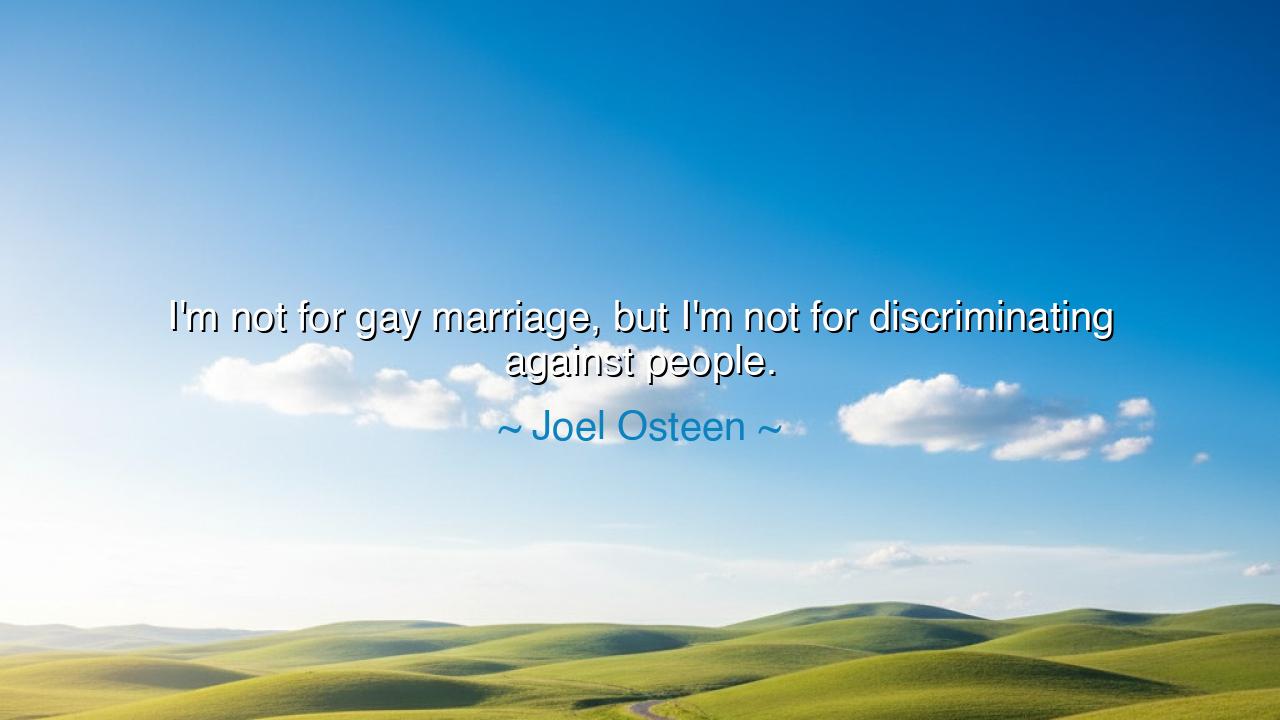
I'm not for gay marriage, but I'm not for discriminating against






“I’m not for gay marriage, but I’m not for discriminating against people.” — Joel Osteen
In these careful and contemplative words, Joel Osteen, a modern preacher known for his message of hope and encouragement, expresses the delicate tension that lies between conviction and compassion. His statement does not come from defiance, but from a deep attempt to balance belief and humanity — the eternal struggle between what one holds as sacred truth and what one owes to others as fellow children of God. When Osteen declares that he is “not for discriminating against people,” he affirms a timeless teaching: that even when beliefs diverge, dignity must remain untouched. His words are an effort to walk the narrow path between faithfulness to personal creed and the universal commandment of love.
The origin of this quote can be found in the public discourse of the early twenty-first century, a time when societies across the world were wrestling with the question of same-sex marriage. As a pastor of one of the largest congregations in America, Osteen was often pressed to state his position. He, like many of faith, stood within a tradition that defines marriage as a union between a man and a woman, yet he sought to temper that conviction with grace rather than condemnation. His statement emerged from that moral crossroads — a moment that tested the meaning of tolerance, the limits of dogma, and the heart’s capacity for empathy.
To understand his words, one must recognize that humanity has long grappled with this same paradox. Throughout history, there have been those who clung to principle yet still chose mercy over judgment. In the Gospels, Christ Himself dined with those whom society condemned — not to approve their ways, but to show that love is greater than law. The ancient philosophers, too, understood this balance: that the mark of wisdom is not in the rigidity of one’s position, but in the spirit of fairness that governs it. Osteen’s statement reflects this lineage — the attempt to live within belief while refusing to use it as a weapon.
There is a story from the early Church that captures this spirit. A woman accused of grave sin was dragged before the elders to be condemned. Yet a wise teacher stood among them and said, “Let he who is without fault cast the first stone.” In that silence, judgment melted into reflection, and the stones fell from their hands. Osteen’s words echo this same restraint — that even when one disagrees, one must not degrade. For discrimination, whether born of fear or pride, poisons the soul. It divides where love seeks to heal, and blinds where faith should illuminate.
His statement also speaks to a broader truth about the evolution of moral understanding. Humanity is ever in tension between tradition and transformation. Each generation inherits the beliefs of its ancestors but must interpret them anew in the light of compassion. Osteen’s hesitation reflects not hypocrisy, but humility — the awareness that faith and justice must coexist, even when their harmony is difficult to maintain. In this way, his words are both a mirror and a challenge: a mirror reflecting society’s struggle to reconcile morality with mercy, and a challenge to ensure that conviction never hardens into cruelty.
The ancients would have said that true righteousness is measured not by whom one excludes, but by how one treats those with whom one disagrees. In kingdoms and empires long gone, laws were made to separate and punish; yet the sages, prophets, and poets of every age rose to remind the powerful that all souls bear the same divine spark. Equality of worth, even amidst difference, has ever been the mark of wisdom. Thus, Osteen’s distinction — between belief and discrimination — is a plea to remember that love is not diminished by disagreement, nor does kindness require conformity.
Let this, then, be the teaching for those who seek to live rightly: hold your beliefs with conviction, but hold humanity with greater care. The purpose of faith is not to build walls, but to cultivate compassion. Whether one agrees or disagrees on matters of doctrine, no man or woman should be denied respect, nor treated as less than whole. As Joel Osteen reminds us, it is possible to stand firm in what one believes while still bowing to the eternal command of love. For in the end, it is not doctrine that will judge us, but the measure of mercy we have shown to others.






AAdministratorAdministrator
Welcome, honored guests. Please leave a comment, we will respond soon